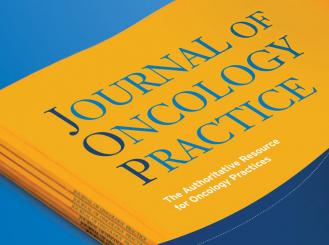Jan 05, 2015
By Shira Klapper, Senior Writer/Editor
A study in the Journal of Oncology Practice (JOP) identified several building blocks that are essential in shifting a cancer center towards a more interdisciplinary model.
The study, “Assessing the Development of Multidisciplinary Care: Experience of the National Cancer Institute Community Cancer Centers Program,” was published online, ahead of print, October 21, 2014. According to first author, Eliot L. Friedman, MD, the study offers a blueprint for other hospitals that wish to start multidisciplinary clinics.
The study reported on the progress of the National Cancer Institute Community Cancer Centers Program (NCCCP), established by NCI in 2007 with the goal of improving the quality of care and expanding research in community cancer centers. One of the major goals of the NCCCP was to encourage the development of multidisciplinary clinics (MDCs) in community cancer centers. In an MDC, doctors from different disciplines come together formally and frequently to discuss medical cases in real time and to devise treatment plans for patients. One of the hallmarks of MDCs is that patients are seen in clinic by the medical oncologist, radiation oncologist, and surgeon on the same day.
Sites charged with assessing their own progress
When the NCCCP launched in 2007, 10 participating sites were charged with creating an assessment tool to measure their success in developing MDCs for three tumor types: breast, colon, and lung. Working together, the sites developed an assessment tool that measured progress along the following nine areas: interdisciplinary case planning for each patient, physician engagement, integrated teamwork, infrastructure, care coordinators (staff who are integrated into the teams and who help guide patients through treatment), financial planning, screening and enrollment onto clinical trials, use of medical records, and overall quality improvement in medical care and outcomes. These factors were scored on a scale of one to five, with one being “evolving MDC” and five being “achieving excellence.”
The assessment, which was completed by 14 sites at three time points—in 2010, 2011, and 2012—also included an open-ended, qualitative question: “For each assessment area in which the level increased over time, what actions did you implement which resulted in those advancements?” This question was designed to gather information that could help develop future MDCs.
Marked improvement in interdisciplinary care
The JOP study highlighted six areas that showed the highest percentage of positive change from 2010 to 2012.These included: case planning, physician engagement, treatment team integration, integration of care coordinators, quality improvement, and clinical trials.
As far as the qualitative question, the answers showed that successfully shifting the cancer centers toward a more multidisciplinary model rested on three essential factors: Prospective case planning, which encourages the team to proactively develop a clinical care plan for an individual patient’s clinical situation; use of care coordinators, who enable patients to stay engaged with clinicians from various disciplines and ancillary services throughout treatment; and lastly, the Conditions of Participation (COP), which were developed at each participating institution.
Conditions stipulated by the COP include that participating clinicians must take part in the NCCP’s research and quality improvement initiatives, gain expertise on specific tumor types, and enroll in continuing education, among others conditions.
In addition, the COP reinforces the individual hospitals’ commitment to the program, an important factor considering that the more time physicians devote to multidisciplinary meetings, the less time they have for seeing patients in their individual offices, which may lead to a loss in revenue.
Looking ahead
According to Dr. Friedman, this JOP study can guide the development of future MDCs. “There have been studies before showing that MDCs can improve various aspects of the oncology patients’ experience. But now, for the first time, we have a blueprint for how to set one up.”
Eliot L. Friedman, MD, is a Medical Oncologist and a Clinical Researcher at Lehigh Valley Health Network, in Allentown, Pennsylvania. He has been an ASCO member since 1988 and served as President of the State Affiliate Council Committee from 2011-2012.
Source
Read the abstract of the original JOP article.
View the PDF of the original JOP article.
Friedman EL, Chawla N, Morris PT. Assessing the development of multidisciplinary care: experience of the national cancer institute community cancer centers program. J Oncol Pract. Epub 2014 Oct 21.
The Exclusive Coverage series on ASCO.org highlights selected research from JCO and JOP with additional perspective provided by the lead or corresponding author.
@ 2014 American Society of Clinical Oncology

